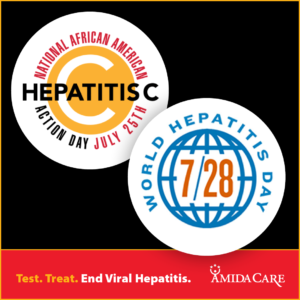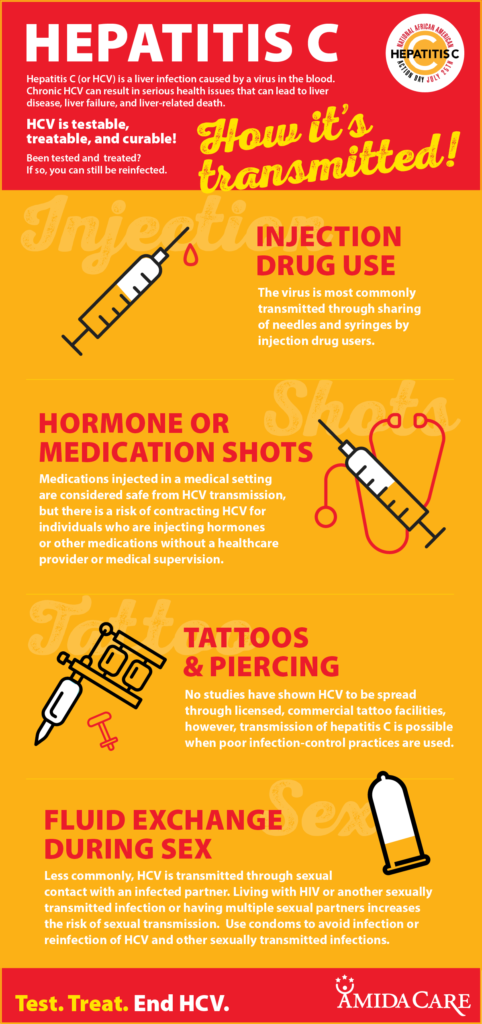Test. Treat. End Viral Hepatitis.

Hepatitis C is a liver infection caused by the blood-borne hepatitis C virus (HCV). Between 70 and 85 percent of HCV infections cause long-term, chronic conditions that can result in serious health problems, including liver cancer and liver-related death. The majority of those with the virus are unaware they are infected, because there are often no symptoms. Thankfully, there is a cure, so it’s crucial that those at risk for Hepatitis C are screened so they can begin treatment immediately.
National African American Hepatitis C Action Day

African American communities are especially vulnerable to HCV. Though they comprise less than 15 percent of the U.S. population, African Americans account for approximately a quarter of the 3.5 million Americans living with chronic hepatitis C. Established in 2013 by the National Black Leadership Commission on AIDS (NBLCA), National African American Hepatitis C Action Day (NAAHCAD) is July 25, an opportunity to promote HCV prevention, testing, and treatment.
There is no vaccine for hepatitis C, but treatment with antiviral medications can cure it. That’s why it is so important to get tested and get treatment. New treatments are incredibly effective and have minimal side effects. Amida Care has helped over 1,200 members access treatment for HCV, with a 95% cure rate.
Even if you have been cured of hepatitis C, you can still be re-infected. The most common method of HCV transmission is sharing needles or other equipment used to inject drugs, but the virus may also be transmitted through sexual contact, hormone or medication shots, or tattoos and piercings. The Centers for Disease Control (CDC) recommends that all adults born between 1945 and 1965 get tested once for HCV, as well as anyone who ever injected drugs or is living with HIV. A quarter of Americans living with HIV also have Hepatitis C, and liver damage progresses more rapidly in those who are co-infected.
World Hepatitis Day
A few days after NAAHCAD is World Hepatitis Day on July 28, a time to acknowledge the global impact of hepatitis and emphasize the importance of testing and being linked to care. Over 300 million people worldwide are unaware they are living with viral hepatitis.
Though hepatitis A is relatively rare in the U.S., hepatitis B is more prevalent, especially among Asian Americans and Pacific Islanders. Left untreated, it can lead to liver cancer, a leading cause of cancer deaths among Asian Americans. However, a vaccine can prevent its transmission, and treatment is also available.
Though Asian Americans and Pacific Islanders make up less than 5 percent of the U.S. population, they account for more than 50% of the nearly one million Americans living with chronic hepatitis B. The CDC recommends testing people born in regions with high rates of hepatitis B, including sub-Saharan Africa and Asia and the Pacific Islands; as well as unvaccinated people born in the U.S. who have at least one parent born in a country with high hepatitis B rates.
Remember: hepatitis C can be cured, and hepatitis B can be treated with medication or prevented by a vaccine!
Resources:
- National Black Leadership Commission on AIDS (NBLCA)
- Project Inspire: NYC Hep C Care Coordination Program for Medicaid and Medicare Recipients
- Hep Free NYC
- Information from the CDC about hepatitis C
- Information from the CDC about hepatitis B
- Information from the CDC about hepatitis A
- World Hepatitis Day
